Welcoming a dog into your family is a big step, especially for a child with special needs. A dog can provide companionship, emotional support, and even therapeutic benefits. But with so many breeds available, how do you know which one to pick?
We’ve compiled a list of the five best dog breeds families consider when looking for a dog for a special needs child.
Best Dog for Special Needs Child
- Labrador Retriever
- Poodle
- Golden Retriever
- Bernese Mountain Dog
- Cavalier King Charles Spaniel
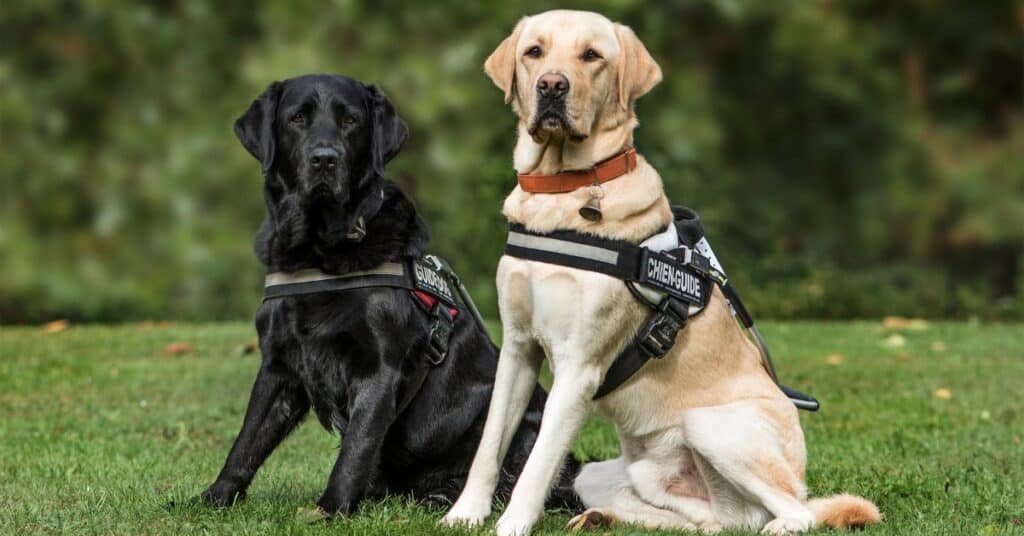
1. Labrador Retriever
Labrador Retrievers (Labs) are America’s favorite dogs for a reason. These intelligent, eager-to-please pups are renowned for their gentle and calm temperament. Their medium size makes them perfect for playing fetch or cuddling on the couch without overwhelming smaller children with special needs.
How Labrador Retrievers Can Help Your Special Needs Child:
- Emotional Support: Labs are known for their calm and gentle demeanor, offering a comforting presence for children who might experience anxiety or emotional distress.
- Performs Helpful Tasks: Labs are highly trainable and excel at learning tricks and performing tasks like picking up dropped objects or opening doors. Their eagerness to please makes them excellent candidates for service dog training.
- Playful Companion: Labs love to play fetch or go for walks. This active lifestyle can encourage children to participate in physical activity.
Considerations:
- Temperament: Gentle, playful, patient
- Size: Medium (around 55-75 lbs)
- Energy Level: Moderate to high (daily walks and playtime are essential)
- Grooming Needs: Moderate (brushing a few times a week)
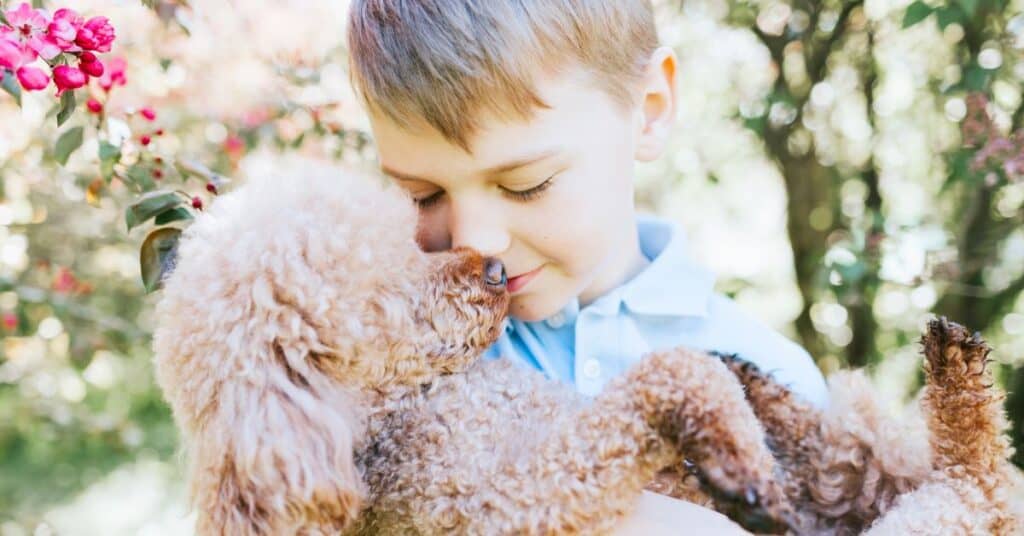
2. Poodle
Poodles are highly intelligent and affectionate, making them perfect companions for many special needs children. These pups can be trained as comforting pets and exceptional service dogs in standard, miniature, and toy sizes.
How Poodles Can Help Your Special Needs Child:
- Non-Shedding Relief: Poodles are hypoallergenic, making them an excellent choice for families with allergies.
- Emotional Support Buddy: Poodles are incredibly attuned to their owner’s emotions. They can provide emotional support and comfort to children during challenging moments.
- Smart and Trainable: Poodles are highly intelligent and easily trained. They can learn tricks and commands that can be incorporated into therapy routines or for fun.
Considerations:
- Temperament: Intelligent, playful, loyal, highly trainable
- Size: Standard (over 45 lbs) or Miniature (under 15 lbs)
- Energy Level: Moderate to high (regular exercise is essential)
- Grooming Needs: High (regular brushing and professional grooming every 4-6 weeks)
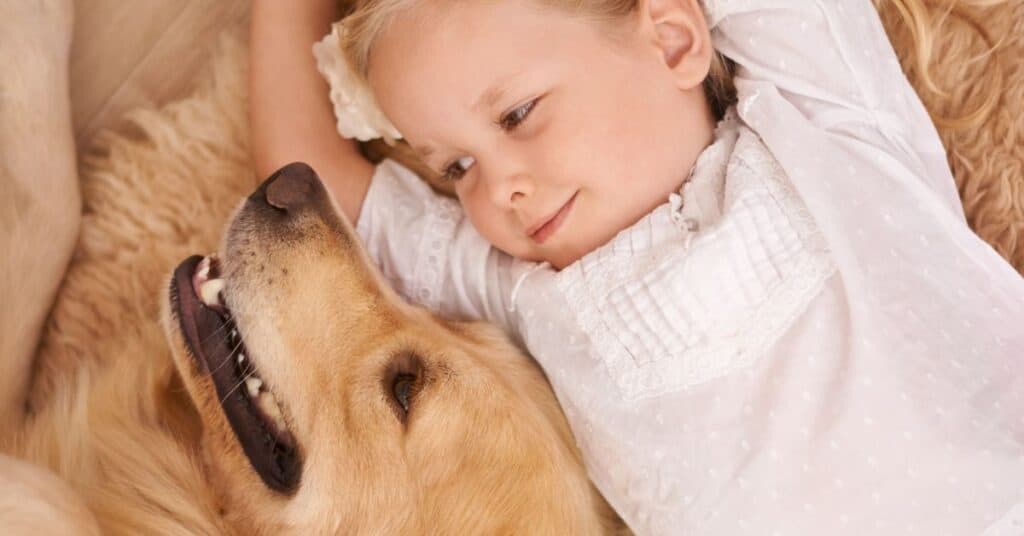
3. Golden Retriever
Golden Retrievers are gentle, adaptable, and eager to please, making them a wonderful companion for special needs children. Golden Retrievers are an ideal fit for families seeking a balance between a low-energy and high-energy dog. They require daily exercise but are happy to cuddle on the couch after an active day.
How Golden Retrievers Can Help Your Special Needs Child:
- Social Bridge: Golden Retrievers are friendly and outgoing, which can help children with social anxieties feel more comfortable interacting with others. They can act as a social bridge during outings or playdates.
- Therapy Partner: Golden Retrievers excel at learning tasks and commands. They can be trained as service dogs to assist children with mobility issues or specific needs.
- Loyal and Loving: Golden Retrievers form strong bonds with their families. Their loyalty and affection can provide a sense of security and comfort for a special needs child.
Considerations:
- Temperament: Gentle, playful, intelligent, eager to please
- Size: Large (around 65-75 lbs)
- Energy Level: Moderate to high (daily walks and playtime are essential)
- Grooming Needs: Moderate (brushing a few times a week)
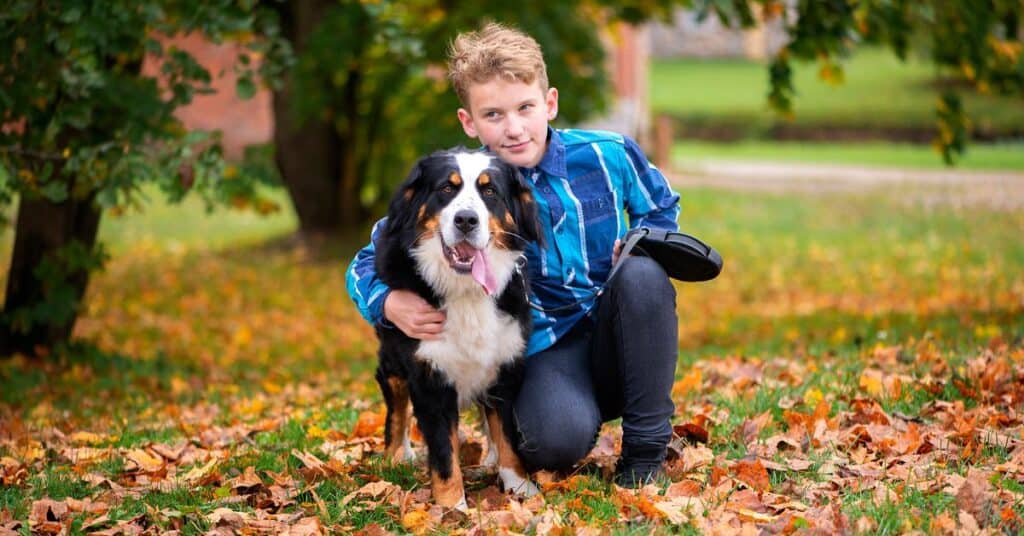
4. Bernese Mountain Dog
The Bernese Mountain Dog is a fantastic choice for families seeking a gentle giant. While their size requires some extra space, their loyalty and helpful nature make them an excellent companion for a child with special needs.
How Bernese Mountain Dogs Can Help Your Special Needs Child:
- Gentle Giant: Bernese Mountain Dogs offer a calm and patient demeanor, perfect for children needing a soothing presence. Their large size can provide a sense of security and comfort.
- Therapy Assistant: These intelligent and eager-to-please dogs can also be trained for various therapeutic tasks, such as deep pressure therapy or providing stability while walking.
- Family Helper: Bernese Mountain Dogs are known for their helpful nature. They can be trained to perform tasks around the house, making them a valuable addition to the family.
Considerations:
- Temperament: Gentle, patient, intelligent, eager to please
- Size: Large (around 70-115 lbs)
- Energy Level: Moderate (daily walks and playtime are important but less demanding than some breeds)
- Grooming Needs: Moderate to high (brushing a few times a week and professional grooming occasionally)
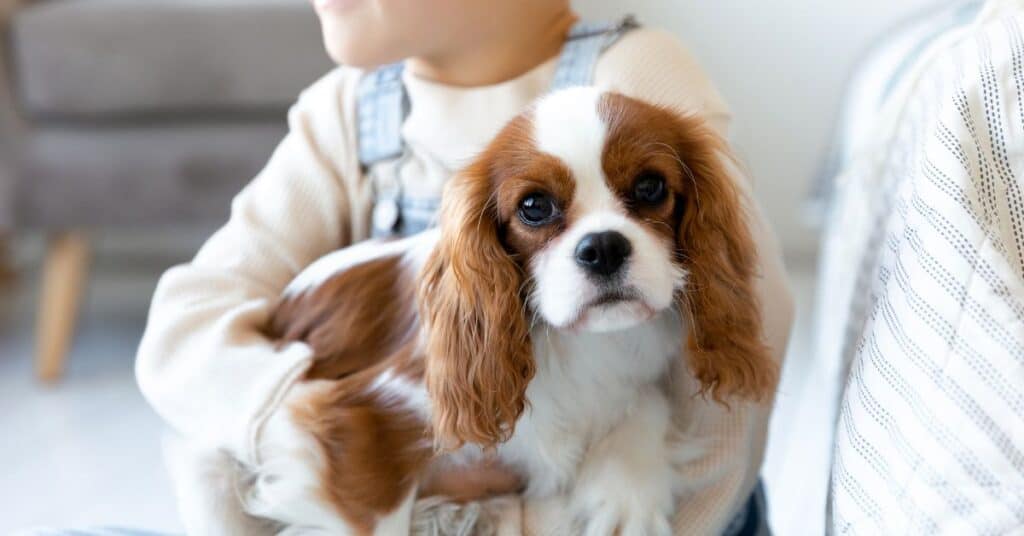
5. Cavalier King Charles Spaniel
The Cavalier King Charles Spaniel offers a loving, affectionate personality for families seeking a smaller companion. They get along well with small children and other pets and are adaptable to their owner’s lifestyle.
How Cavalier King Charles Spaniels Can Help Your Special Needs Child:
- Cuddly Comfort: These gentle dogs are known for their affectionate personalities. Their small size makes them ideal for cuddling on the couch or offering comfort during challenging times.
- Low-Maintenance Exercise: They have a lower energy level than some breeds. They are content with moderate exercise, making them a good fit for families with limited mobility.
- Adaptable Companion: These calm and adaptable dogs adjust well to various living arrangements, making them suitable for apartments or smaller homes.
Considerations:
- Temperament: Gentle, affectionate, calm, adaptable
- Size: Small (around 13-18 lbs)
- Energy Level: Low to moderate (regular walks and playtime are important but less demanding than larger breeds)
- Grooming Needs: Moderate (brushing a few times a week)
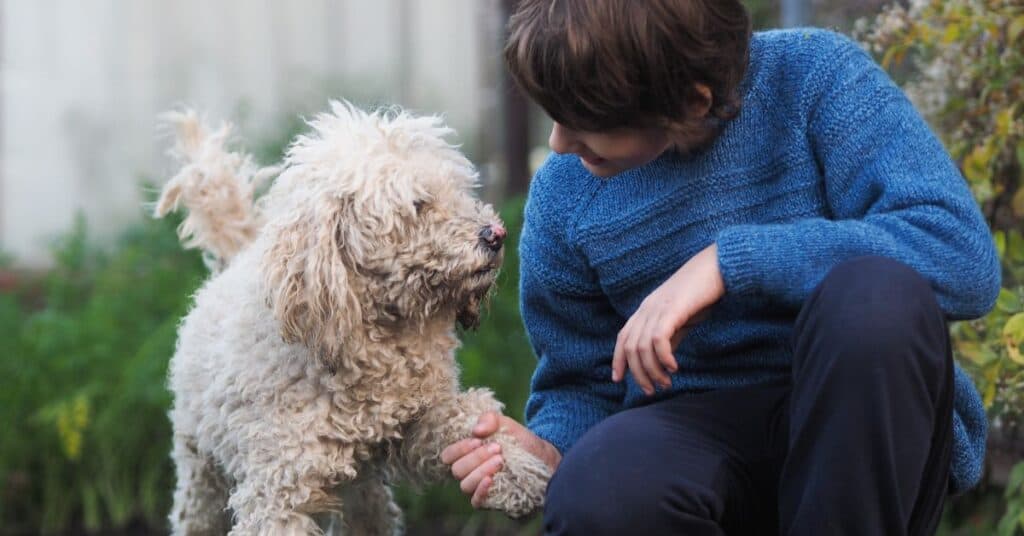
Choosing the Perfect Dog for Your Special Needs Child
Many wonderful dog breeds make great companions for a special needs child. Choosing the right breed is just the first step.
To ensure a smooth transition for everyone, consider the following:
- Match: Align the dog’s size, temperament, and energy level to your child’s needs and abilities.
- Lifestyle: Ensure your living space and routine accommodate the dog’s exercise and attention requirements.
- Training: Commit to ongoing training and socialization for a well-behaved, supportive companion.
Visit shelters or reputable breeders to meet different dogs and find the perfect canine match for your special needs child.
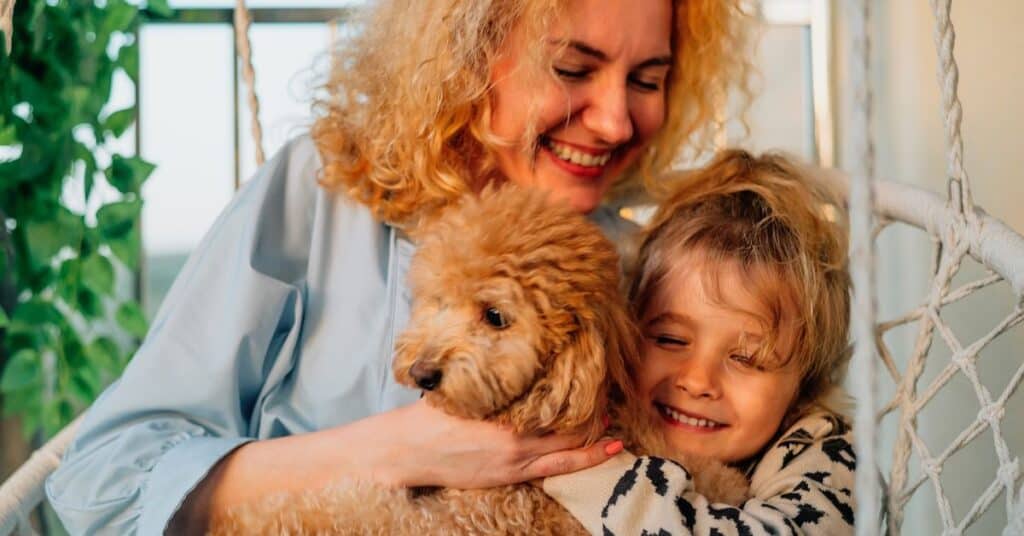
Preparing Your Child for Their New Best Friend
Careful preparation can ensure a smooth and positive introduction. Here are some key tips to help your child feel comfortable and confident around their new friend:
- Open Communication: Talk openly with your child about how to interact with the dog gently and calmly. Consider reading age-appropriate books about dog training together, like “Dog Training for Kids.” You can find the book here on Amazon. This can help them understand basic commands and proper handling techniques.
- Supervised Interactions: Always supervise all interactions between your child and the dog, especially during the initial introduction phase. Teach your child appropriate greetings, such as gentle petting, and explain the importance of avoiding rough play that might frighten the dog.
- Gradual Introduction: If you’re unsure how your child or the dog will react to each other, start with gradual introductions in controlled settings. This could involve allowing your child to see and smell the dog through a safe barrier before direct contact. An indoor dog gate (like this one on Amazon) can help create a safe barrier to ease the introduction process.
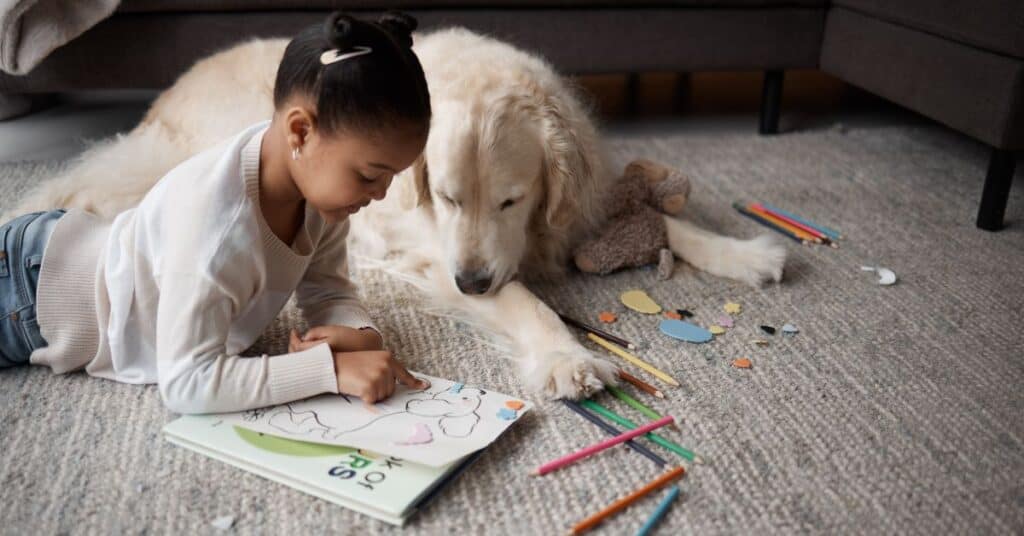
Involving Your Child in the Welcome Process
Getting your child involved in the welcoming process can not only build excitement but also foster a sense of responsibility and ownership towards their new canine companion. Here are some ways to get them started:
- Choosing Fun Supplies: Pick out food and water bowls together. Look for fun colors or designs that your child will enjoy. This can make feeding time a positive experience for both of them.
- Comforting Touches: Select a special toy or blanket for the dog. This can become a comfort item for both your child and the new pet during introductions, creating a sense of security.
- Welcome Sign Creation: Let your child help create a welcome sign for the new dog. This can be a fun way to build excitement and anticipation for their furry friend’s arrival.
By following these tips and carefully preparing your child for their new canine companion, you can lay the foundation for a strong and loving bond that will enrich both of their lives.
The Best Dog for Special Needs Child is the one that complements your child’s unique personality and needs. With careful planning and a whole lot of love, your new family member can bring endless joy and companionship to your special needs child.
